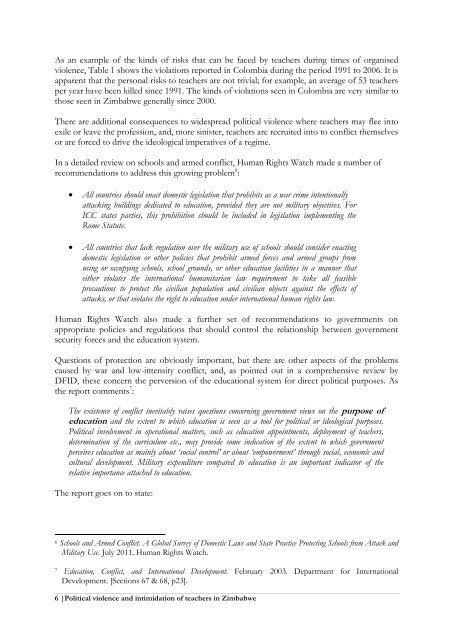Political violence and intimidation against Teachers in Zimbabwe
Political violence and intimidation against Teachers in Zimbabwe
Political violence and intimidation against Teachers in Zimbabwe
Create successful ePaper yourself
Turn your PDF publications into a flip-book with our unique Google optimized e-Paper software.
As an example of the k<strong>in</strong>ds of risks that can be faced by teachers dur<strong>in</strong>g times of organised<br />
<strong>violence</strong>, Table 1 shows the violations reported <strong>in</strong> Colombia dur<strong>in</strong>g the period 1991 to 2006. It is<br />
apparent that the personal risks to teachers are not trivial; for example, an average of 53 teachers<br />
per year have been killed s<strong>in</strong>ce 1991. The k<strong>in</strong>ds of violations seen <strong>in</strong> Colombia are very similar to<br />
those seen <strong>in</strong> <strong>Zimbabwe</strong> generally s<strong>in</strong>ce 2000.<br />
There are additional consequences to widespread political <strong>violence</strong> where teachers may flee <strong>in</strong>to<br />
exile or leave the profession, <strong>and</strong>, more s<strong>in</strong>ister, teachers are recruited <strong>in</strong>to to conflict themselves<br />
or are forced to drive the ideological imperatives of a regime.<br />
In a detailed review on schools <strong>and</strong> armed conflict, Human Rights Watch made a number of<br />
recommendations to address this grow<strong>in</strong>g problem 6 :<br />
<br />
<br />
All countries should enact domestic legislation that prohibits as a war crime <strong>in</strong>tentionally<br />
attack<strong>in</strong>g build<strong>in</strong>gs dedicated to education, provided they are not military objectives. For<br />
ICC states parties, this prohibition should be <strong>in</strong>cluded <strong>in</strong> legislation implement<strong>in</strong>g the<br />
Rome Statute.<br />
All countries that lack regulation over the military use of schools should consider enact<strong>in</strong>g<br />
domestic legislation or other policies that prohibit armed forces <strong>and</strong> armed groups from<br />
us<strong>in</strong>g or occupy<strong>in</strong>g schools, school grounds, or other education facilities <strong>in</strong> a manner that<br />
either violates the <strong>in</strong>ternational humanitarian law requirement to take all feasible<br />
precautions to protect the civilian population <strong>and</strong> civilian objects <strong>aga<strong>in</strong>st</strong> the effects of<br />
attacks, or that violates the right to education under <strong>in</strong>ternational human rights law.<br />
Human Rights Watch also made a further set of recommendations to governments on<br />
appropriate policies <strong>and</strong> regulations that should control the relationship between government<br />
security forces <strong>and</strong> the education system.<br />
Questions of protection are obviously important, but there are other aspects of the problems<br />
caused by war <strong>and</strong> low-<strong>in</strong>tensity conflict, <strong>and</strong>, as po<strong>in</strong>ted out <strong>in</strong> a comprehensive review by<br />
DFID, these concern the perversion of the educational system for direct political purposes. As<br />
the report comments 7 :<br />
The existence of conflict <strong>in</strong>evitably raises questions concern<strong>in</strong>g government views on the purpose of<br />
education <strong>and</strong> the extent to which education is seen as a tool for political or ideological purposes.<br />
<strong>Political</strong> <strong>in</strong>volvement <strong>in</strong> operational matters, such as education appo<strong>in</strong>tments, deployment of teachers,<br />
determ<strong>in</strong>ation of the curriculum etc., may provide some <strong>in</strong>dication of the extent to which government<br />
perceives education as ma<strong>in</strong>ly about ‘social control’ or about ‘empowerment’ through social, economic <strong>and</strong><br />
cultural development. Military expenditure compared to education is an important <strong>in</strong>dicator of the<br />
relative importance attached to education.<br />
The report goes on to state:<br />
6 Schools <strong>and</strong> Armed Conflict. A Global Survey of Domestic Laws <strong>and</strong> State Practice Protect<strong>in</strong>g Schools from Attack <strong>and</strong><br />
Military Use. July 2011. Human Rights Watch.<br />
7 Education, Conflict, <strong>and</strong> International Development. February 2003. Department for International<br />
Development. [Sections 67 & 68, p23].<br />
6 |<strong>Political</strong> <strong>violence</strong> <strong>and</strong> <strong><strong>in</strong>timidation</strong> of teachers <strong>in</strong> <strong>Zimbabwe</strong>

















